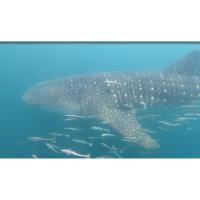Destin-Fort Walton Beach Tourism Participates in Unique Whale Shark Tagging Effort
The Coastal Resource team with Destin-Fort Walton Beach Tourism in Okaloosa County recently participated in a collaborative effort that led to the tagging of two whale sharks, Ivey and Oliver, in the Gulf of Mexico south of Destin-Fort Walton Beach, Florida.
This unique research opportunity was successful due to a joint effort between, the National Oceanic and Atmospheric Administration (NOAA), the University of Southern Mississippi, Okaloosa County’s Coastal Resource team, and the fishing community.
“We are extremely excited and proud of the work our Coastal Resources team has done with this collaboration,” said Okaloosa County Board Chairman Trey Goodwin. “Whale sharks are an amazing species and we are thrilled they made an appearance in our Gulf of Mexico waters. We look forward to the results of this research.”
Reports from commercial and recreational fishermen were crucial in identifying the location of these gentle giants to the team of researchers. Ivey, a 25-foot female, was named after the daughter of the boat captain that sighted it. Oliver, a 40-foot male was named after the child that was on a boat fishing with his family when they spotted it.
Both whale sharks were tagged with a satellite and acoustic tag. The satellite tag will send information if the dorsal fin breaks the surface, while the acoustic tag will send location information if the whale shark passes by a receiver.
Biological samples were also collected for genetic research along with video documentation to confirm the length and sex of each animal. The video will also provide imagery of the side of each whale shark showing the unique dot pattern that can be used like a fingerprint and help identify them if they are seen anywhere else.
“This was an incredible opportunity for us as marine biologists and we are lucky that we were able to help with this effort right here in Destin-Fort Walton Beach,” said Coastal Resources Manager for Destin-Fort Walton Beach Tourism, Alex Fogg. “We could not have done this without the help of the fishing community. Whale shark aggregations such as this aren’t very normal in our area. We get reports of one or two here and there but this is certainly unique, especially for this amount of time. They may be here for food or some other reason but that is one of the reasons why we want to get some tags out, to maybe answer some of these questions.”
Note: All whale shark activities were permitted by the state of Florida and the Federal Government. If you see a whale shark, please observe them from a distance to avoid unneeded harassment. The public can help the research by reporting whale shark sightings at https://bit.ly/WhaleSharkSighting.

